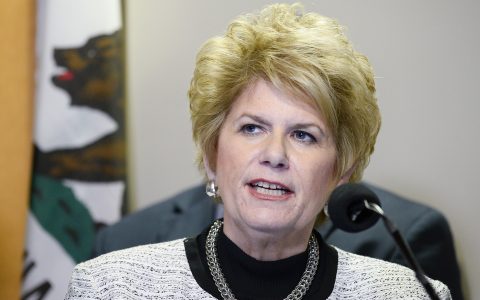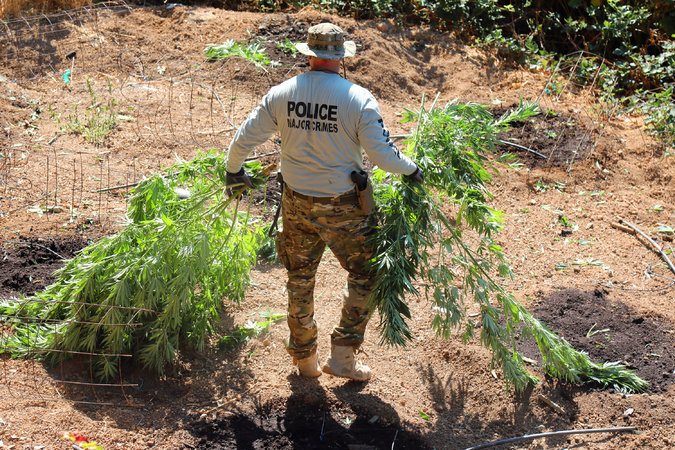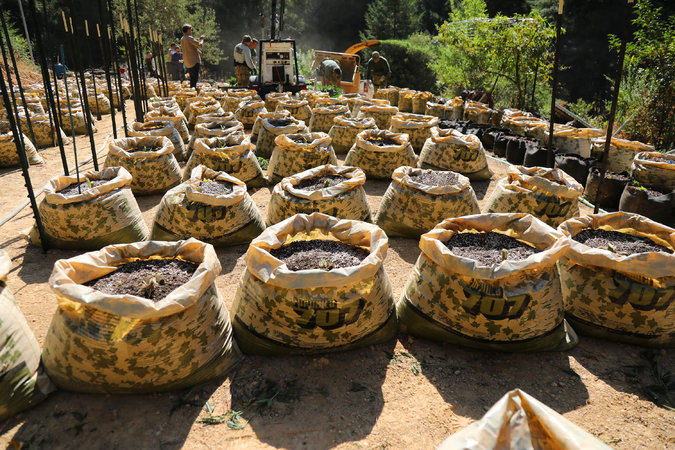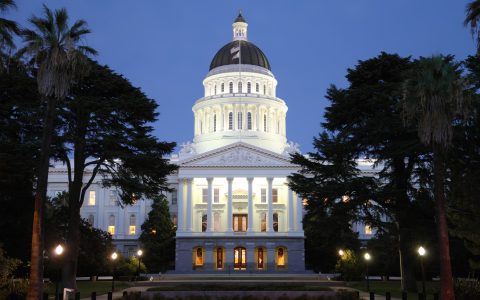Legal Marijuana Is Almost Here. If Only Pot Farmers Were on Board.
LAYTONVILLE, Calif. — From the sky they look like citrus groves, neat rows of lush emerald-colored plants set amid the hills of Northern California.
But as a police reconnaissance helicopter banked for a closer look on a recent afternoon, the pungent smell of marijuana plants filled the cabin, wafting up from 800 feet below.
“That’s all weed,” squawked a deputy with the Mendocino County Sheriff’s office over the helicopter intercom. “They’re not in the program.”
More than nine months after California voted to legalize recreational marijuana, only a small share of the tens of thousands of cannabis farmers in Northern California have joined the system, according to law enforcement officers and cannabis growers.
Despite the promise of a legal marketplace, many growers are staying in the shadows, casting doubt on the promise of a billion-dollar tax windfall for the state and a smooth switch to a regulated market.
Continue reading the main story
At the same time, environmental damage and crime associated with illegal cannabis businesses remain entrenched in the state despite legalization, law enforcement officials say.
“I know that the numbers don’t look great; there are a lot of folks that aren’t coming in,” said Hezekiah Allen, the executive director of the California Growers Association, a marijuana advocacy group. “People are losing faith in this process.”
California, which by one estimate produces seven times more marijuana than it consumes, will probably continue to be a major exporter — illegally — to other states. In part, that is because of the huge incentive to stay in the black market: marijuana on the East Coast sells for several times more than in California.
“There are very few areas you can go in the county and not find marijuana — it’s everywhere,” said Bruce Smith, a lieutenant with the Mendocino County Sheriff’s Office who leads the county’s efforts to shut down illegal marijuana farms. “The vast majority aren’t permitted.”
Mendocino County has received 700 applications for permits to grow marijuana, according to the Mendocino Department of Agriculture. That is a fraction of the thousands of growers in the area.
“You have folks who have been operating for two decades with maybe some local oversight and some with no oversight at all,” said Lori Ajax, the chief of the state’s Bureau of Cannabis Control. “You want to first give people a chance to get into that regulated market. And then it’s going to take some strong enforcement.”
November’s legalization measure, Proposition 64, decriminalized the possession of small amounts of marijuana, allowed individuals to grow six plants at home and set rules for the sale and cultivation of regulated plants, seeking to end what had been two decades of a freewheeling and largely unregulated medical cannabis system. The punishment for growing or possessing large amounts of unregulated marijuana was downgraded to a misdemeanor from a felony.
Photo
Illegal marijuana plants are removed by the Mendocino County Sheriff’s Department. The plants are then shredded. Credit Jim Wilson/The New York Times
Based on data from various state and county agencies, Mr. Allen, of the growers association, estimates that about 11 percent of growers — about 3,500 of 32,000 farmers in the Emerald Triangle, which covers Mendocino, Humboldt and Trinity counties — have applied for permits. Most have been deterred by the voluminous paperwork to obtain a permit, the fees and the taxes, he said.
Critics said the framers of the law might have also miscalculated because many growers say there is little upside from getting a permit. If they stay out of the system, they face lighter punishments and avoid paying taxes, fees and the cost of meeting environmental standards.
“You could have 1,000 pounds in your hotel room right now and you might be charged with just a misdemeanor,” Thomas D. Allman, the sheriff of Mendocino County, said. In a small number of cases, traffickers can be charged with conspiracy, which is a felony.
David Eyster, the Mendocino district attorney, said the surge in the marijuana business had brought with it violent crime, which did not appear to be going away anytime soon.
Among the cases he is handling are a robbery and slashing death of a grower; the murder of a man at a marijuana farm by a co-worker wielding a baseball bat; an armed heist in a remote area by men who posed as law enforcement officers; and a robbery by two men and a juvenile who were invited to a barbecue and then drew guns on their hosts and fled with nine pounds of marijuana.
“The folks in the big cities, they don’t realize that out in the rural areas where the marijuana is being grown, there are people being robbed, kidnapped and in some cases murdered,” Mr. Eyster said.
California took a different path from Colorado, the first state to legalize marijuana, where possession of large amounts of unregulated cannabis remains a felony and where the black market is significantly smaller, according to Sean McAllister, a lawyer who specializes in cannabis cases in both states.
“As someone who has lived through the transition in Colorado, when I go to California I am definitely shocked to see that people in the industry seem very ill-prepared for the transition,” Mr. McAllister said.
California Today
The news and stories that matter to Californians (and anyone else interested in the state), delivered weekday mornings.
Police officers in Mendocino County said their priority was to go after people who cause environmental damage or who grow on public lands. So far this year they have raided 74 sites and eradicated more than 90,000 plants. Illegal plots are identified by helicopter and then destroyed by a convoy of well-armed police officers and a plant shredder towed by a pickup.
“I think we can all agree that your average pot smoker shouldn’t be in prison,” said Shannon Barney, a lieutenant in the Mendocino sheriff’s office who helped lead a raid in August that ended in the destruction of more than 800 plants. “But I think everybody can also agree that punishment for a major trafficker needs to be more severe.”
Small-scale growers have planted marijuana in the backwoods of the Emerald Triangle for decades. But in recent years Northern California has seen what has been called a “green rush” of entrepreneurs with a more laser-focused profit motive and often little regard for forests famous for their giant redwood trees.
The cannabis business has attracted investors and growers from across the world, including Bulgarians, Russians, Chinese, Hmong, Jamaicans and Mexicans.
The state’s licensing system does not start until January and most counties are still accepting applications so it is possible that more growers will choose to enter the legal market.
Photo
So far this year, law enforcement officials in Mendocino County have raided 74 sites and eradicated more than 90,000 plants. Credit Jim Wilson/The New York Times
But Mr. Allen of the growers association said there was already ample reason to be concerned. At the current levels of participation, he said, there may not be enough regulated marijuana to serve the legalized market, a highly paradoxical situation in a state that is by far the largest cannabis producer.
Growers in California complain that the legalization process has been opaque and confusing. For the last two decades growers operated under a lightly regulated system of medical cannabis collectives. Legalization now brings a deluge of rules passed by towns, counties and the state.
As his eight-foot-tall plants were being hauled to the shredder, a grower who gave his name as Chris, who declined to give his last name, said he had not made an effort to obtain a permit because he thought he could grow 25 plants and still be legal.
“This has been such a peaceful experience until today,” he said. “They just ripped out my whole garden I’ve been working on since February.”
In a number of crime categories — violent crime, robbery, aggravated assault and murder, among them — the Emerald Triangle is near the top of the list of California most crime-ridden counties.
The violent crime rate in Mendocino County is seven times higher than in Los Angeles County, according to F.B.I. data from 2015, the latest year available. To be sure, crimes are more statistically prominent in Mendocino County because of its small population of about 87,000.
The sustained black market is also a concern for environmentalists, who say marijuana grown illegally in public forests cuts into hillsides, siphons water from creeks and is treated with pesticides that foul the water. At the end of the season, growers often leave behind tons of trash.
“It’s a shame to see the degradation of the land that my industry created,” Eli Scislowicz, the manager of a Nevada cannabis business who worked for many years in California. Environmentally conscious marijuana growers exist, he said. “But there’s a lot of irresponsible actors too, that have poisoned the ground.”
In environmentally conscious California, police officers said they were much more likely to get a jury conviction for pollution or damage to the land than for possession.
“There’s romance with marijuana. People think it’s a harmless herb,” Sheriff Allman said. “But environmental crimes make people angry.”
The potent odor of the plants, which can waft for dozens of yards, is also a major irritant among some residents; complaints about smell are the most common marijuana-related calls received by the police in Mendocino, Lieutenant Smith said.
Growing marijuana is so well entrenched in the Emerald Triangle that police officers here see an uphill battle in the state’s effort to regulate the industry.
“I’ve arrested grandparents, parents and grandchildren in different years for growing marijuana on the same piece of property,” Sheriff Allman said. “You get into a generational thing that’s almost like moonshine. People think, ‘Why do I have to get permits? My parents didn’t have to and my grandparents certainly didn’t have to.’”







